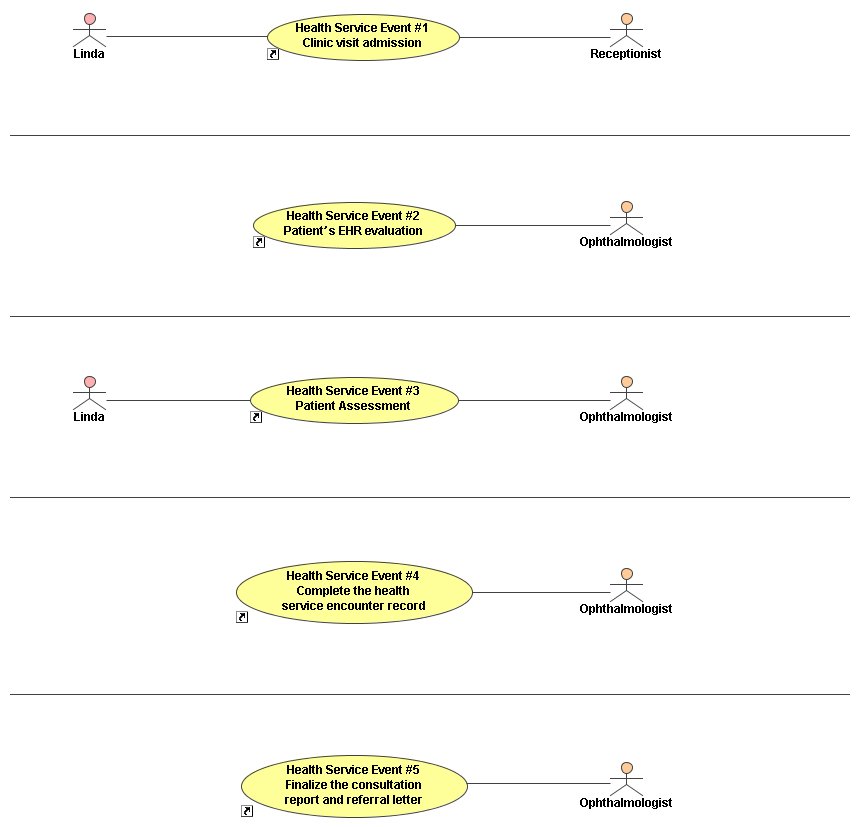
|
(Author: Brent Jones – April 12th, 2005)
Ophthalmologist (4.1.2) Storyboard: Multiple Sclerosis (4.1)
Linda Lambert has been referred by her family doctor to an ophthalmologist, Dr. Hine. The appointment occurs the next day as the problem is described as urgent.
When she arrives at the clinic, Linda stops first at the registration desk where the receptionist records demographic information about her and creates a record of her visit in the clinic’s ADT system. Linda provides consent regarding the storage and use of her health information and the receptionist creates an EMR for her.
Just before seeing Linda, Dr. Hine accesses Linda’s records and submits a search for the referral letter created by Dr. Black, which summarizes the clinical case and outlines the reason for the consultation. From that he accesses the findings in the latest optometrist’s assessment referenced in the referral document. He also reviews Linda’s health profile.
Dr. Hine takes the history from Linda and does a pertinent examination. Linda reports some vision loss and pain in her right eye that came on acutely. Exam shows some swelling of the disc. Dr. Hine diagnoses optic neuritis. Based on Linda’s description of a similar previous episode, Dr. Hine reviews her records to see the clinical notes from that time. He submits a search for encounters by provider type (ophthalmologists or optometrists) and by ophthalmologic diagnoses. He is able to review the encounter note from the family physician from five years ago. The findings reported are limited but he feels that it may have been the same problem and that this is now a second episode.
Given the distinct possibility that Linda’s optic neuritis could be related to multiple sclerosis, Dr. Hine orders an MRI of the brain and refers her to a neurologist, Dr. Lewis. He dictates his consultation report along with a referral letter to Dr. Lewis.
Two days later Dr. Hine reviews the typed consultation report and referral letter and saves them to the clinic’s EMR.
Assumptions
· Able to view detailed clinical data from the past
· Able to search EHR based on multiple criteria including, but not limited to, provider, provider role, diagnosis, date of service, type of encounter
· A copy of the consultation report and referral letter are sent to the EHR when they are saved to the EMR
· A notification is sent to the referring doctor that the consultation report is now available
Tables
|
Name |
Phone number |
|
Address |
|
|
Birth date |
Health care number |
|
Emergency contact person |
|
Patient name |
Patient birth date |
|
History of present illness |
Past ophthalmologic history |
|
Past medical history |
Medications |
|
Allergies |
Examination |
|
Provisional diagnosis |
Management plan |
Referral to Neurologist
|
Patient name |
Patient phone number |
|
Patient date of birth |
Patient healthcare number |
|
History |
Relevant past medical and ophthalmologic history |
|
Doctor name |
Doctor phone number |
|
Doctor ID number |
References to relevant documents |
This health service follows upon the referral to ophthalmologist health service (see 4.1.1) and describes all the health service events taken during the patient visit for the first time to the ophthalmologist in the jurisdiction where he lives. The patient has already lived in another jurisdiction.
Each health service event takes place during a same period of time (e.g. without cut of time), in presence or not of involved client; the health service events can be grouped in a health service encounter.
| General Info | |
|---|---|
| Name | 4.1.2 Ophthalmologist Encounter Diagram |
| Type | Use Case Diagram |